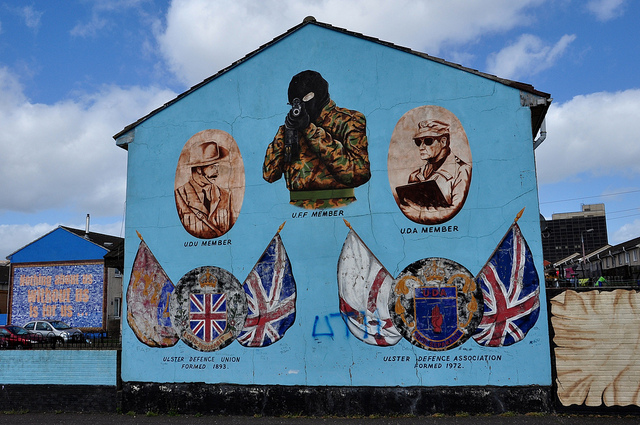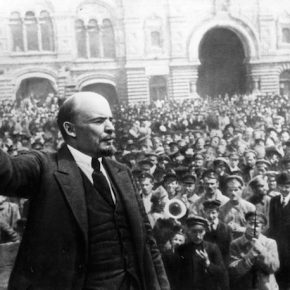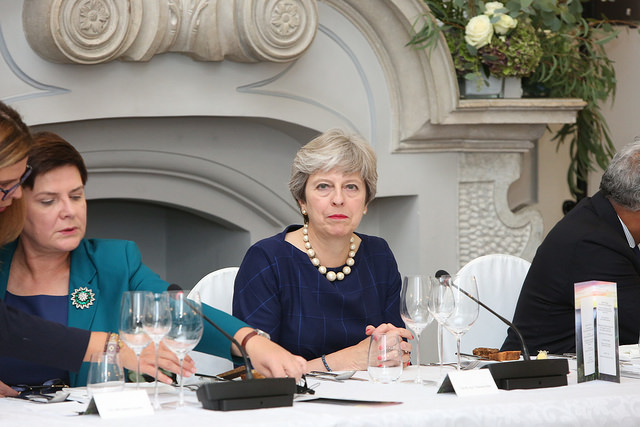When I heard the Queen’s speech was being delayed, I wondered what could be behind this. The Conservatives and the Democratic Unionists were still plotting behind closed doors. Suddenly an image appeared to me. The speech was really being delayed because Her Majesty was going to appear wearing a UDA beret instead of the crown, flanked by the Orange Order and balaclava-wearing gunmen.
Well, not quite. What exactly the DUP want from the Conservative government has not been confirmed, however, we can approximate what kind of policy agenda they have from their past record. In fact, the Democratic Unionists put forward ‘The Northern Ireland Plan‘ when it was speculated they might be left kingmakers in the 2015 election. This document might give us an idea of what to expect.
It features two sets of bulletpoints running alonside each other: one for Westminster, one for Stormont. The position is populist: tough on crime, tough on terror, tough on immigration, yet it’s for animal rights, ring-fencing welfare and cutting taxes for business in the same package. This is while Stormont has ‘opt-outs’ from UK laws on marriage equality and abortion.
There has been a lot of talk about these subjects and it’s important, but it’s also unlikely that Arlene Foster would try to ban abortion in Britain. What is more likely is that the DUP will act to assert influence over British policy in Northern Ireland. That is where the real risks lie. Contentious issues such as flying the Union flag on public buildings, and ‘protecting’ former soldiers and police officers accused of violence during the Troubles, are where the DUP will likely assert itself.
What Brexit means in all of this is doubtful. Theresa May pitched her entire administration on a ‘hard’ Brexit, whereas Foster advocates a ‘soft’ Brexit with a soft Irish border. The majority of people in Northern Ireland supported Remain, fearing British troops being sent to the Irish border. A more subtle version of this would be more scrutiny on people moving between the two Irelands and the British mainland.
Earlier this year the DUP lost its dominant position in the Northern Irish Assembly, in an election triggered by Joint First Minister Martin McGuinness. Ever since then the deals have been scuppered, Sinn Fein refuses to reach an agreement with the DUP ostensibly because of the ‘cash for ash’ corruption scandal. But this is likely an excuse.
Sinn Fein wants to gain leverage over the Assembly and squeeze concessions out of the Unionists. It’s not simply that the Irish nationalists have the upper-hand now either. Together Sinn Fein and the SDLP have 39 seats, whereas the combined DUP-UUP vote is 38 seats. The non-sectarian parties (People Before Profit, the Greens and the Alliance) add up to five seats, but this means they can sway the vote towards either side.
So for the first time in history, there is no government in Stormont and the DUP is about to prop up a minority Tory government in Westminster. If no power-sharing agreement is made by the end of the month, then Northern Ireland will be run directly from London. No executive can take shape without an agreement between Sinn Fein and the DUP. And the clock is ticking.
The Conservative government may pretend that they can compartmentalise Northern Irish affairs, and keep them separate from their arrangement with the DUP, but it just doesn’t plausible. It’s difficult to imagine the May government remaining neutral in Ulster. May has already described the DUP as her “friends”, stressing her party’s historic commitment to the Union.
At the same time, May has brought back the neoconservative Michael Gove. Not only is Gove the much despised Brexit campaigner and destroyer of school budgets, he is also a hardliner on Northern Ireland. Gove was opposed to the Good Friday Agreement and called for a return to the shoot-to-kill policy. He believed it was still possible to defeat the IRA by military force.
The possibility of being governed by the Conservative Party, in an alliance with Foster, might push Sinn Fein to find a compromise. It’s plausible that Michelle O’Neill wouldn’t want to run the risk of being governed directly by a Tory-DUP pact. Certainly if Sinn Fein was looking to use the ‘cash for ash’ scandal as leverage, the Democratic Unionists now have the upper-hand. This is a completely unprecedented situation.
Even when John Major lost his majority in 1996 he sought out the help of the Ulster Unionist Party, who used to try and put a respectable face on unionism. Notably the voting pact kept the Major government going long enough to be defeated by New Labour. Yet in that short period of time, the role of the UUP was enough to hamstring the peace process.
It wouldn’t be until 1998 that the conflict would finally be brought to a close. Tony Blair got the credit for years of work behind closed doors. And the British public began to put Northern Ireland to the back of their national psyche. Ironically Major has now resurfaced to express concerns that the peace process may be jeopardised by the Tory-DUP pact.
As Major has acknowledged, the Good Friday Agreement is not simply going to be shredded over night. There is a consensus on the peace settlement now, but the dangers arise from the imbalances of power and the way sectarian divisions have been institutionalised in Stormont. Much like how the peace accords in Bosnia only cemented the nationalist demands of Serb and Croat Bosnians.
The Good Friday Agreement represented a consociational arrangement to ensure no one side could achieve total dominance. This was meant to guarantee compromise and power-sharing. Of course, the problem is it leaves a lot of problems unsolved and a permanent stalemate at the heart of the political process. As if the aspirations of dissident republicans and loyalists would disappear.
On the one hand, you have Ulster loyalists who feel their culture and way of life is under threat from absorption into the Irish Republic; on the other, you have Irish republicans who feel the cause of reunification has been stalled. For these people, the Good Friday Agreement is a world away from where things should be.
Meanwhile the British public are rediscovering Northern Ireland exists and its inhabitants still have many problems and that those problems are our problems too. In more ways than one now that the Conservative government needs the DUP to save it from an even worse humiliation at the ballot box.
Photograph courtesy of Chris Tank. Published under a Creative Commons license.





